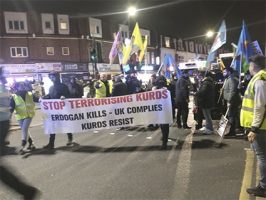Trial against 6 Kurds in London postponed for 13 months

Posted: December 22, 2024
The first court hearing of the six Kurds, who were detained after simultaneous raids by the cops on 27th November against the Kurdish Community Centre (KCC) and private homes, and remained in custody for 14 days, was held at Old Balley Criminal Court on Friday.
Co-chair of the Kurdish People’s Assembly in Britain, Türkan Budak, KCC activist Ercan Akbal, politician Ali Poyraz, activists Agit K., B.K., and Mazlum S. were present at the first hearing of the trial, which is evaluated as a ‘criminalisation operation’ against Kurds.
The court set a date for the trial at January 2026, and it will last for 12 weeks. The court will ask for all evidence to be presented on this date. Submissions by the cops are to be presented by 18 April 2025. Then, Defence lawyers have until 30 May 2025 to submit their defence.
All the defendants are on “conditional release”. As far as we know, all have been released from police cells and all have electronic tags. It seems the “conditions” include being banned from carrying out any political activities and they can’t get close to KCC. They can only leave their homes for things like food shopping and are not allowed to go out after 7 p.m.
One of their lawyers stated that the prosecution is clearly politically motivated: “It is clear that the defendants have been specifically targeted to disrupt their legitimate, rights-based activism both in the UK and internationally, particularly in relation to the Kurdish question. Such actions by the authorities appear designed to undermine the momentum of their political demands and to stifle dissenting voices in defence of Kurdish rights and autonomy.”
Pointing out that the so-called evidence presented during the interrogation phase at the police station is highly questionable, one legal representative said: “Rather than pointing to any illegal activity, it mainly consists of documents and references to the defendants’ legal campaigning and advocacy work on the Kurdish issue. This raises serious concerns about the abuse of legal mechanisms to charge individuals for exercising their fundamental rights.”
Noting that the cops’ case is based on ‘membership in a banned organisation’, the lawyer added the following: “The so-called evidence essentially relates to activities protected under international human rights law, including freedom of assembly, thought, expression, and protest. Citing these protected activities as evidence of criminal behaviour not only undermines the rule of law but also poses a serious threat to democratic freedoms. This case provides a disturbing example of how legitimate political expression and activism can be weaponised by the authorities to suppress dissent and silence advocacy. The wider implications of such prosecutions should not be underestimated, as they jeopardise fundamental freedoms and erode confidence in the justice system. This case is part of a worrying trend.”
Category: Uncategorized
